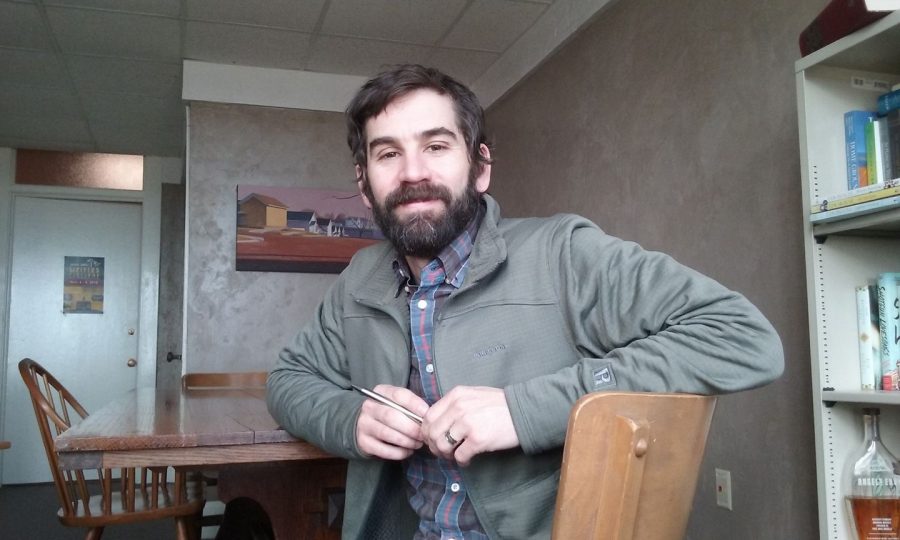Lowe develops book during sabbatical leave
March 24, 2017
Nate Lowe, dean of the School of Humanities and Fine Arts and associate professor of writing, has been on sabbatical leave to work on a book of essays.
Lowe explained, “The concept is that each of the essays focuses on a different pickup truck that I have been in throughout my life, from my childhood growing up on farms and ranches in the rural Midwest to the time I spent as an adult in the Pacific Northwest. I’ve counted at least 35 trucks I have been in that I can remember with some specificity and each of them contains its own narrative.”
Lowe said that he’s not sure on which of the 35 essays will be in his book yet, but once he’s completed all of the essays, he will narrow it down.
“The landscapes, the people, the length and the content of each essay will be unique, but the book’s connective tissue—what links the essays to each other—is the recurring image of the pickup truck,” Lowe said.
“I can remember exactly where the idea came from: the John Michael Kohler Arts Center in the fall of 2011. The exhibit I visited had to do with memory in the arts, and William Powhida had this huge four inches by seven inches piece of white paper filled with tiny penciled portraits of all the people he remembered from his life—I would estimate about 250—and each face was encircled with a one-sentence narrative or small memory. The artwork is titled ‘Some People I’ve Met From Memory (that I care to remember).’ I stood with the piece for at least 30 minutes and then I returned the following week to see it again,” Lowe stated.
The artwork inspired him to do exercises in his advanced nonfiction class at Lakeland. Lowe always does the exercises along with his students. For one exercise, he selected automobiles as his topic, starting a list that developed into his work now.
“But as I worked on my own piece, I recognized that my focus was shifting more specifically to the pickup trucks that I grew up in as a child—some rusty, some dented, few brand new, some iconic but some insignificant in my life. Very quickly my list pushed to around 35 to 40 pickups that I could remember riding in with some detail or story. And as I began to write about each one, I realized that this project was bigger than one essay could hold,” Lowe explained.
“Writing, at its most basic level, is mostly about getting your butt in the chair to do it. I’ll put it this way: my reading and research bring to the table new ideas or new ways of seeing a particular topic, but my inspiration to write is internal. I enjoy being in the creative process because it leads me to places that I didn’t know I was capable of,” Lowe said.
Lowe stated, “I’m reading a lot of new collections of essays right now and they have become great teachers for me. They are teaching me how to write essays (because one never stops learning), how to think about the world in new ways, how to shape interesting sentences and how to structure book projects.”
Lowe puts in a lot of time and effort into his work. He stated, “My typical Monday through Friday routine is to get some exercise in the morning and then write from about 10 a.m. to 4 p.m., which is mostly spent writing with some breaks to do research, reflect in a journal or read. It’s good to take breaks from the computer screen and come up for air. I like to spend my nights reading, everything from essays to novels to poetry.”
Lowe started this project about two and a half years ago, which actually started as a single essay on his uncle and grandfather, their farm and their pickup trucks.
“These two men were romantic and reckless figures in my life and when I started to write about their pickup trucks, I started to find new ways of describing their lives and these machines they seemed to adore and destroy. I’m still not finished with that essay (it will be one of the longest essays in the book), but writing that essay has made me see more clearly how the essays in the book will come together.”
Lowe has faced setbacks, but has had a positive outlook on them. “Setbacks are as much a part of the creative process as successes. These are not things to be feared or avoided, but instead they become learning opportunities,” he emphasized.
Lowe’s sabbatical leave is for the spring semester of 2017, ending in May, but he stated that the work will take more time than that to complete.


